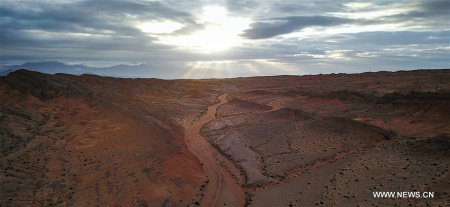

Photo taken on Aug. 18, 2017 shows China's future Mars simulation base in Hongya (Red Cliff) region of Haixi Mongolian and Tibetan Autonomous Prefecture in northwest China's Qinghai Province. About 400 million yuan (61 million U.S. dollars) are expected to invest in the Mars scientific research base and eco-tourism site. The red rock area in Qaidam basin in western Qinghai has been called the most "Martian" place on Earth, with its natural features, landscape and climate all similar to those on the red planet. The base is expected to consist of a "Mars community" and a "Mars campsite." The campsite will have a number of experimental module-like accommodations. It will be built as a one-stop base for experiential learning in aerospace, astronomy, geography and new energy. (Xinhua/Wu Gang)
China is building a "Mars village" on Earth that simulates the environment of the Red Planet, as the country prepares its Mars exploration projects in 2020.
Scientists and the local government have mapped out a 400-million-yuan ($61 million) development plan to build the Mars simulation base and eco-tourism site on a red rock basin in Northwest China's Qinghai Province.
"As China's only Mars science and recreation base, we hope to focus on the science of space exploration," Liu Xiaoqun, a lunar and deep-space exploration scholar at the Chinese Academy of Sciences (CAS), told the Global Times.
Liu attended a three-day planning meeting in Haixi Mongolian and Tibetan Autonomous Prefecture in Qinghai Province, which began on Sunday. The meeting was held to discuss the development of the Mars simulation base.
The simulation base will be built in the red rock area of the Qaidam basin in western Qinghai, considered the most "Martian" place on Earth, with its natural features, landscape and climate all similar to those on the Red Planet, the Xinhua News Agency reported.
The base is expected to consist of a "Mars community" and a "Mars campsite." The former will be a theme park, while the campsite will simulate a base on Mars.
Liu said it will be built as a one-stop base for experiential learning of aerospace, astronomy, geography and new energy.
"The building of the Mars village has both scientific and ecological significance. It will improve public awareness of space exploration while bringing economic benefits to Haixi," said Zhang Biao, vice mayor of the city of Delingha, Haixi.
The Haixi government and the Chinese Academy of Sciences signed an agreement in November last year to build the base, and they have since begun discussing the project's site.
CAS scientists have participated in the planning of the village.
Minor benefits
"Exploring Mars may not necessarily benefit us, but will cement China's scientific and technological expertise, which encourages innovation and increases China's core competencies," Jiao Weixin, a space science professor at Peking University, told the Global Times.
Liu said the base will provide an ideal space for aerospace and geological studies of students.
However, Jiao said the simulation base may be of little help in generating interest about Mars. "Although the terrain closely resembles that of Mars, in terms of atmosphere, magnetic field and gravity, it will be difficult for the Mars simulation base to imitate the original," Jiao said, adding that this base will also do little to help China's exploration of Mars.
China plans to launch its first Mars probe by 2020, Wu Yanhua, vice director of the China National Space Administration, was quoted by Xinhua as saying.
A second Mars probe will bring back samples and conduct research on the planet's terrain, composition and environment, Wu said.
China hopes to become a space power by 2030 with an advanced and open aerospace industry and space infrastructure.
However, Jiao noted that China still faces technological hurdles because it lacks a deep space network, advanced orbiter and lander. (Global Times)

86-10-68597521 (day)
86-10-68597289 (night)

52 Sanlihe Rd., Xicheng District,
Beijing, China (100864)

